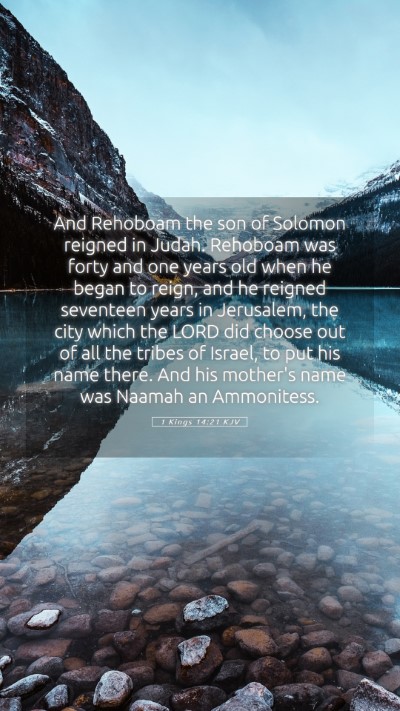Understanding 1 Kings 14:21: A Comprehensive Bible Verse Commentary
The verse 1 Kings 14:21 reads: "And Rehoboam the son of Solomon reigned in Judah. Rehoboam was forty-one years old when he began to reign, and he reigned seventeen years in Jerusalem, the city which the Lord had chosen out of all the tribes of Israel, to put His name there. And his mother's name was Naamah, an Ammonitess."
This verse marks a significant moment in the history of Israel, focusing on Rehoboam's reign in Judah. Below we will explore its meanings and implications through insights drawn from esteemed public domain commentaries such as those by Matthew Henry, Albert Barnes, and Adam Clarke.
General Overview
This passage introduces Rehoboam as a king of Judah, highlighting his age, the duration of his reign, and his mother's identity. Each element plays a role in understanding not just the man, Rehoboam, but also the theological and historical context within which he ruled.
Age and Duration of Reign
Rehoboam began his reign at the age of 41 and ruled for 17 years, which suggests a time of maturity but also implies a possible connection to the previous generation's failures, particularly that of Solomon's. Matthew Henry notes that despite his age, Rehoboam's decisions were marked more by impulsiveness than wisdom, leading to significant consequences for the nation of Israel.
The City of Jerusalem
The mention of Jerusalem as the city chosen by God to place His name signifies its importance in the life of Israel. Albert Barnes expounds that this choice reflects God's covenant with His people, a place where they would worship and encounter the divine presence. This selection set Jerusalem apart as a central focus for Israel’s identity and faith.
The Role of Naamah
Rehoboam's mother, Naamah, an Ammonitess, adds a crucial layer to the narrative. Adam Clarke highlights that this lineage indicates potential influences on Rehoboam's character and policies. His Ammonite heritage may have introduced foreign practices that contributed to a less than faithful leadership.
Key Themes and Insights
The verse encapsulates themes of leadership, identity, and divine purpose. Here are several insights based on traditional commentaries:
- Leadership Qualities: The character of a leader profoundly affects a nation. Rehoboam's eventual decision to act rashly in response to counsel (which results in the division of the kingdom) stemmed from his inability to demonstrate wise leadership.
- Divine Choice: God's sovereignty is displayed through His choice of Jerusalem, suggesting that God actively engages in guiding the destinies of nations.
- Influence of Heritage: The mention of Rehoboam's mother urges readers to consider the impact of familial and cultural backgrounds on personal development and decision-making.
- Historical Significance: Acknowledge this moment as pivotal; Rehoboam's reign ultimately led to the division of Israel into the northern kingdom of Israel and the southern kingdom of Judah.
Bible Study Applications
Understanding 1 Kings 14:21 affords rich applications for contemporary readers. Here are a few:
- Reflect on Leadership: Consider how qualities of leadership in historical figures resonate with modern-day expectations for leaders in both spiritual and secular realms.
- Identity with Faith: Reflect on how one's heritage and background inform one's faith and actions, encouraging a commitment to align these with God's purpose.
- Intercessory Prayer: Use this narrative as a catalyst for praying for leaders, recognizing the profound impact they have on communities and nations.
Cross References
- 1 Kings 12 - Discusses the division of the kingdom, offering context that illuminates Rehoboam's actions.
- 2 Chronicles 10 - Provides further details on Rehoboam’s response to the people's request and the subsequent division.
- 1 Kings 11:7-8 - Highlights Solomon's idolatry influenced by foreign wives, setting a legacy challenging Rehoboam's reign.
- 2 Kings 12:1-3 - Provides insight into the legacy of kingship in Judah and how it echoes through subsequent generations.
Conclusion
Through examining 1 Kings 14:21, readers can glean valuable insights about leadership, the weight of heritage, and God’s overarching plan in history. Utilizing tools such as Bible study resources, online study guides, and group discussions, one can deepen their understanding of Scripture and its implications for both ancient and modern contexts.
This analysis demonstrates the richness of Scripture and the necessity of engaging with it through a thoughtful lens, enhancing our comprehension of complex narratives and teachings in the Bible.


